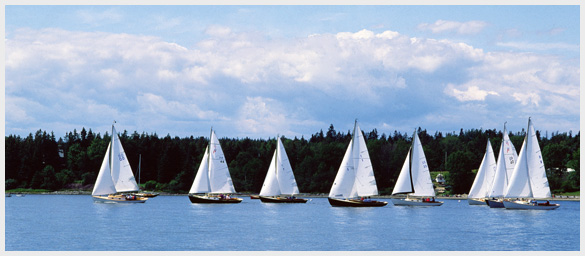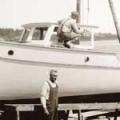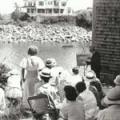Letters - Issue 106
Issue 106
 Bridges Point 24s, Photo ©Benjamin Mendlowitz
Bridges Point 24s, Photo ©Benjamin MendlowitzKent Mullikin
Research Triangle Park, North Carolina
Carpe Diem I was taken by the prelude to the “View from the Porch” musings in your July issue. I could relate to the expression of gratitude for any summer-like day that came outside of the too-short time period that is a Maine summer. But the reverie was lost when I came to the last sentence. In the 21 books written about his adventures, Captain Jack Aubrey never said “Waste not a minute.” What he did say a few dozen times was “There is not a minute to lose!” Although it does not have a nautical theme, I think a more appropriate person to quote would have been Robin Williams. He said “Carpe diem.”
Grant Hughes
San Diego, California, and Bernard, Maine
Peter Bass replies Mr. Hughes is incorrect. He needn’t have lost his reverie. I did a Google search before I used that quote. Using the search terms “waste not a minute” and “Jack Aubrey” brings up a number of instances of this phrase by Captain Jack—in the books Master and Commander and The Ionian Mission, among others. My searches also list “there is not a moment to lose” as a more frequent phrase, although I am sure Aubrey probably said “there is not a minute to lose” also. “Waste not a minute” was my favorite Aubrey-ism for the sentiment.
A Boatyard On Schedule We have read the article on your website (maineboats.com) about the fire at Great Island Boat Yard and their subsequent rebuild. My wife and I own the Little Harbor 52 mentioned in the piece, which had just commenced a major refit at the time of the fire. We had a June deadline for completion of the refit. It may amaze anyone familiar with boatyards to know that we are on our way to Great Island tomorrow (June 15) to pick up the boat, finished on schedule despite all that [GIBY owners] Steve and Stephanie Rowe and their dedicated crew of Maine craftsmen have had to deal with over the winter. Before dealing with Great Island Boat Yard, the idea of a yard being on schedule at all on a nine-month project of this type would have been a source of amusement to me, and the idea of a yard being on schedule under these circumstances unthinkable. Your article captured the exceptional culture of Great Island Boat Yard according to our experience.
Bill Torgerson
Annapolis, Maryland
What Happened To the Outhouse? Picture this: We called it camp. Camp was a place on a cozy Maine pond that we settled into each summer to unwind and rejuvenate, a place much different from the one we woke in most days of the year. To this day the word itself fosters emotions of joy, hope, peace, and tranquility. But then, those words don’t quite cut it. Camp is where my mind travels to on a bad day for solace, or on a good day for reinforcement. Yes, life is not bad, or life is good. As a toddler, it meant nothing to me to have to chase the mice away from their winter shelter to make way for our summer residence. A new leak in the roof would require a strategically placed bucket to limit further damage to the creaky wood floor that sloped one way or another depending on the frost heaves from the previous winter. At some point over the summer, the leak would be patched, eliminating, or at least redirecting the water to another spot, hopefully not to one of the old mattresses we would be sleeping on. The faint glow of the flames from the kerosene lamps was somehow comforting as the sun slipped away over the mountains in the evening. Some nights the full moon glimmering over the lake was all we needed. A simple 278-acre pond, maybe five miles in circumference, 20 feet deep at the deepest spot, in a small mid-coast town provided the backdrop for us. Buckets of water from the pond provided water for cooking and cleaning. Bullfrogs and woodpeckers provided the rhythm and beat section to the loons’ mystical serenade. In the stillness of the morning, you could look into the lake to watch the clouds drift by. By afternoon, the breeze would sweep over the lake, building waves that crashed softly against the sand and rocks along the shore. Amazingly, the landscape has not changed much. We make small changes to our camp each year to keep it up. A recent issue of Maine Boats, Homes & Harbors (May 2009, MBH&H #104) included an article “Simple Cottages, Simple Pleasures” that referred to the difficulty in finding “simplicity” in a Maine cabin. “…Rustic cabins imbued with family history …” are “difficult” to find. Our camp will be passed down to our son for the fifth generation of family ownership. It now features electricity, plumbing, and an access road—all things that were missing when I was first introduced to the camp about 50 years ago. We have progressed a little. But picture this: About 25 yards up the hill from the camp, there used to be an outhouse. The outhouse had louvered walls for ventilation, a smart feature. From the sitting position, at about eye level, there were a couple of louvers missing that allowed a perfect view of the lake. Sorry son, you’ll just have to imagine what that was like. The outhouse is gone, but we keep a picture of it over our fairly new indoor toilet.
Dennis Corcoran
Howell, New Jersey
















